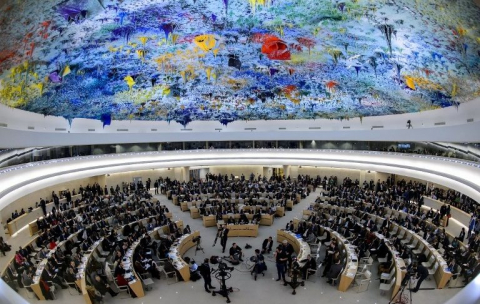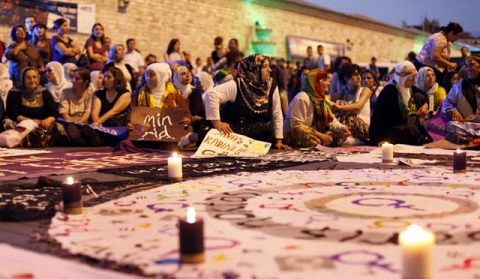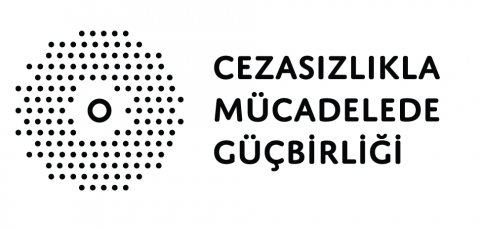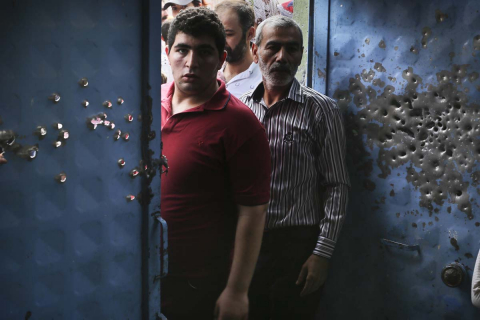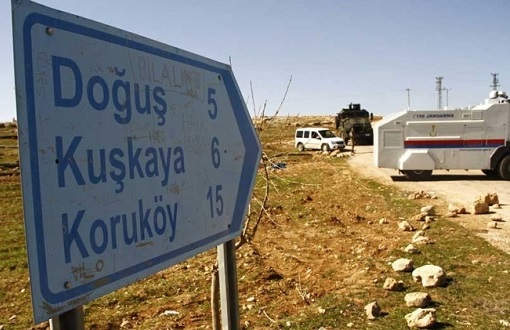
Xerabê Bava (meaning “the ruin of the fathers”; in Turkish also Koruköy or Kuruköy), a Kurdish village in the Mardin province of Turkey has remained under curfew for almost three weeks, as its community of almost a thousand people remained isolated from the rest of the country.
The curfew in Korukoy was declared on February 11 and recently ended on March 2, 2017. It is a recent example of the countless curfews declared in the neighborhoods of Kurdish cities since August 2015. In Nusaybin, the district where Korukoy village is located, at least 22 civilians have lost their lives during as a result of the curfews, according to Human Rights Foundation of Turkey’s (TİHV) media documentation. [1]
The collapse of the 2-year long peace/resolution process also marked the restart of the armed conflict between Turkish government and Kurdistan Workers’ Party. During this time, at least 200 curfews have been declared in 43 districts of 11 Kurdish populated cities. These curfews “affected 1.6 million people and have resulted in the displacement of at least 355,000 people”. At least 321 civilians were reported dead by the Human Rights Foundation of Turkey as at August 2016. [2]
The recent curfews signal the recommencing of these gross human rights violations, if not in the same scale.
The curfews in Turkey are administrative decisions of governorates, justified based on the Law for Provincial Administration. Venice Commission of the Council of Europe, on the other hand, in their legal opinion dated June 13, 2016 concluded that “the Provincial Administration Law, on which decisions imposing curfews were based, and the decisions themselves do not meet the requirements of legality enshrined in the Constitution and resulting from Turkey’s international obligations in the area of fundamental rights, in particular under the ECHR and relevant case-law.”
As we want to draw attention to the alleged abuses in Mardin’s Korukoy, we wanted to remind once again the findings of Nils Muiznieks, Human Rights Commissioner of the Council of Europe, in his previous Memorandum on December 2, 2016, regarding human rights violations during curfews.
“It is also clear from the circumstances that, by their very nature, the curfews and the anti-terrorist operations imposed very severe restrictions on the enjoyment of the rights to private and family life, to the freedom of assembly and association, to receive and impart information and to peaceful enjoyment of property. Given that the relevant Articles of the ECHR require any interference with these rights to be prescribed by law and proportionate, and in the light of his assessment above, the Commissioner considers that systematic human rights violations are also likely to have occurred regarding these rights.
“… All evidence indicates that the authorities did neither treat with the requisite seriousness the allegations of human rights violations, nor conduct ex officio criminal investigations into lives lost during the operations in a way that would be liable to shed light on the events. The priority seems to have rather been to reassure and shield from prosecution the security forces, who have only been subjected to disciplinary sanctions for particularly egregious forms of misconduct with the exception of very few criminal cases where members of security forces were treated as suspects, while at the same time vilifying human rights NGOs and lawyers bringing these allegations. In the Commissioner’s opinion, this situation falls woefully short of Turkey’s international obligations.
This situation brings home the urgency for a mentality shift in Turkey when it comes to the accountability of state agents. The Commissioner considers that impunity has been a nefarious influence throughout Turkey’s recent history, legitimising and fostering behaviour fundamentally at odds with human rights, and undermining all efforts to protect and promote them.”
In the days following the declaration of recent curfew in Korukoy, independent media outlets started reporting serious abuses. According to sources yet to be verified, in the first day of the curfew 39 villagers were detained, 2 disappeared and 3 lost their lives. [3] Fourteen days later, 23 of the detained (3 women, 20 male) were released, on February 24.
Tortured images of one villager, Abdi Aykut, appeared in social media and his situation was taken to the agenda of the Grand National Assembly of Turkey by the People’s Republican Party (CHP) MP Sezgin Tanrıkulu and Osman Baydemir of HDP. [4]
Last week, charges were made for those who were not released. Muzaffer Sarı (from a neighboring village called Doganlar), Abdi Aykut, Vasfi Doğan, İsmail Ay and Mecit Bal were arrested on charges of “help and association to terrorist organization”, and Behçet Koçhan and Hatip Tunç were arrested under charges of “membership to terrorist organization”. Sabri Bayhan, on the other hand, was released from the charge of “help and association to terrorist organization”.
Villagers released: Şevki Akat, Ebubekir Koçhan, Abdullah Doğan, Osman Doğan, Sabri Gürgün, Ali Gürgün, Aziz Gürgün, Edip Ay, Hüseyin Yakut, Hasan Bayhan, Türkan Bayhan, Abdulvahap Zengin, Gülbahar Toy, Şeyhmus Gök, Rıfat Bayhan, Hüseyin Tol, Nihat Göktürk, Emine Göktürk, Abdülmecit Yakut, Haydar Gölcük, Ferhan Doğan, Ferhan Bayhan, Şakir Yakut, Sabri Bayhan.
Villagers under detention: Şükrü Koçhan, Şükrü Gürgün, Ekrem Ertuğrul.
Villagers arrested: Muzaffer Sarı, Abdi Aykut, Vasfi Doğan, İsmail Ay, Mecit Bal, Behçet Koçhan, Hatip Tunç.
Three committees have carried out on-site investigations on the allegations of abuses. [5] The committee members were not allowed to enter the village, so they’ve remained in Nusaybin talking with eye-witnesses. Witness accounts included torture during detention, use of houses as military stations, burning of unused houses, forced labor, starving of animals and interruption of village communication.
From the report of Free Lawyers’ Platform:
“Following the declaration of curfew in Korukoy, the abuses – including the illegal implementation of the act of detention, refusal to allow villagers to meet their needs, degrading treatment, insult and swearing, holding out of information about detentions, repetitive body searches and physical beating – all constitute a crime of torture, given their systematic and continuous nature within the larger context of nation-wide policy of curfews.”
On February 21, the office of the governor of Mardin announced that the rule of law and the safety of life and property of citizens were duly considered, and that 4 members of the PKK were “captured dead” during the operations.
[1] https://hakikatadalethafiza.org/en/curfews-and-civillian-deaths-in-turkey/
[2] https://hakikatadalethafiza.org/en/curfews-and-civillian-deaths-in-turkey/
[3] http://www.kurdishinstitute.be/siege-of-kurdish-village-39-detained-2-disappeared-3-killed-reports/
[4] https://komnews.com/heated-debate-in-turkish-parliament-for-violations-in-under-siege-kurdish-village/
[5] Democratic Society Congress (DTK) and People’s Democratic Party (HDP)[1] on February 18th; Human Rights Association (IHD) and Diyarbakir Bar Association on February 20th on February 20th, and the Free Lawyers’ Platform on February 26th.
